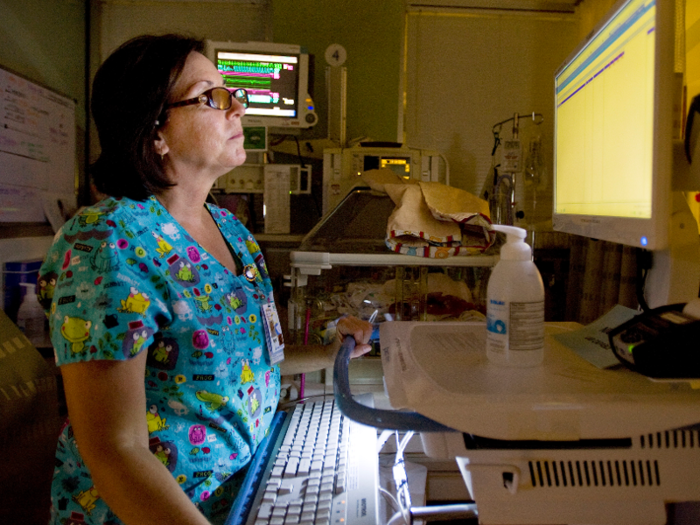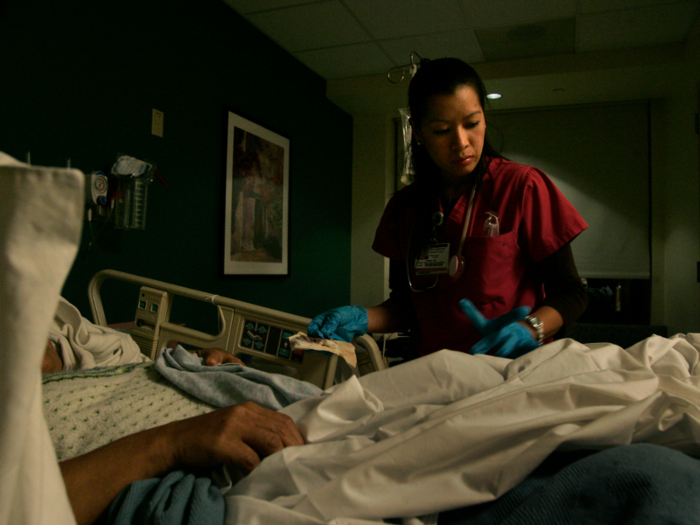- Home
- slideshows
- miscellaneous
- Suicides among nurses are on the rise. Here's why one of America's fastest-growing jobs is facing a major crisis.
Suicides among nurses are on the rise. Here's why one of America's fastest-growing jobs is facing a major crisis.
Nursing is one of the fastest-growing occupations in the country — yet nationwide nurse shortages cause them to work long hours with little time for rest.

Nurses, facing difficulties on the job, are now taking their own lives at rates higher than the general population.

Researchers from the University of California-San Diego School of Medicine conducted the first national longitudinal investigation on nurse suicide in over 20 years, and published their results in June 2019.
The researchers found a suicide incidence of 11.97 per 100,000 people among female nurses. For American women in general, the incidence is 7.58 per 100,000 people. Women overwhelmingly make up the profession, but male nurses are also more likely to commit suicide than men in general, the study found.
While researchers often document burnout and suicide among physicians, very few spend time assessing the state of nursing, lead researcher Judy Davidson told MedPage Today.
"Nurses are known not to care for themselves as much as they care for others," Davidson, a nurse scientist, told the publication. "It's just a part of who we are."
Along with working long hours, nurses often face physical, verbal, and emotional abuse on the job.

One of the most pressing problems facing nurses is abuse on the job, American Nurse Association spokesperson Shannon McClendon told Business Insider in an interview. ANA, a nurse union, says 1 in every 4 nurses is physically assaulted on the job, consistent with other research pointing toward high rates of nurse abuse.
Patients typically abuse nurses, especially people with dementia or Alzheimer's disease. Assaults range from getting cursed at to grabbing and kicking, according to a 2014 survey of more than 5,000 nurses. Visitors have also been reported to abuse nurses. Emergency nurses had the highest likelihood of experiencing abusive behavior.
While many nurses face abuse on the job, few report their experiences, ANA finds — in part because there are no federal rules mandating hospitals protect nurses from violence. Movements such as the #SilentNoMore campaign are attempting to shed light on the hardships facing the profession.
Nurses are one of many groups of people taking their lives at alarming numbers, part of a nationwide suicide epidemic.

More Americans of every age group are taking their lives today than they were 20 years ago, according to a 2018 study by the Centers for Disease Control and Prevention. Other than nursing, occupations like construction work and waitressing saw a spike in suicide rates among workers.
Native Americans are the ethnicity most impacted by suicide, yet the epidemic is rising among white Americans without a college degree, according to a 2017 paper released by the think tank Brookings.
Researchers attributed the rise in suicides in part due to the deterioration of good, blue-collar jobs.
"If you go back to the early '70s when you had the so-called blue-collar aristocrats, those jobs have slowly crumbled away and many more men are finding themselves in a much more hostile labor market with lower wages, lower quality and less permanent jobs," Brookings researcher Angus Deaton told NPR. "That's made it harder for them to get married. They don't get to know their own kids. There's a lot of social dysfunction building up over time."
Many nurse advocacy groups are calling for greater workplace protections.

Davidson pointed to work volume and violence as two of the largest contributing factors toward nurse suicide.
In February, ANA helped introduce a bill that requires the Department of Labor to address workplace violence toward healthcare providers. The mandate would require workplaces to train and educate employees at risk of being harmed, and implement a comprehensive plan to protect nurses from violence.
A New York City nurse union convinced hospitals to ease over-staffing earlier this year after threatening to strike.
"From the bedside to the boardroom, all nurse leaders have a role in creating a healthy work environment supportive of mental well-being," the trade group American Organization for Nursing Leadership said in a statement. "We continue to advocate for funding of mental health resources and are working with fellow nursing organizations to address nurse suicide."
Popular Right Now
Popular Keywords
Advertisement